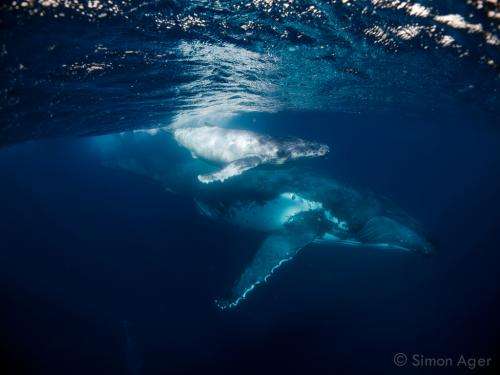Poor nutrition suggested for humpack strandings

A record number of deaths and strandings of humpback whales in Western Australia has raised concern about the impacts of climate change on ocean food webs.
Between 1989 and 2007, the average number of humpback whales (Megaptera novaeangliae) stranded was between two and three. However, in 2008 there were 13 strandings, followed by 46 in 2009 and 16 in 2010.
In 2011, 17 strandings (14 calves and three juveniles) were recorded, representing a rise in the number of young whales perishing than in previous years.
All strandings occurred between Exmouth and Stokes Inlet, east of Esperance, with all calves born at least 1000km south of the regular breeding grounds in the Kimberley region.
In collaboration with the Department of Parks and Wildlife, Murdoch University's Dr Carly Holyoake has conducted post-mortem examinations of the 2011 cases in an attempt to find a cause of death.
"The year 2011 was interesting because we recorded a higher proportion of calves, particularly new born animals, than in previous years," she says.
"Of the animals we examined and conducted post-mortems and the blubber fat measurements, all but one of the calves was in a severely malnourished state.
"Most had very low blubber fat, which is required for energy, thermoregulation and for buoyancy. One individual also had pneumonia which would have made it difficult to breathe and may have contributed to its death."
Changes in ocean food supply could play role
Researchers say the findings in the new born calves suggest the mothers were likely also suffering from severe malnutrition.
"Humpback whales in the southern hemisphere predominantly eat krill. We have concerns what the impact of climate change may be having on krill abundance in the Antarctic," Dr Holyoake says.
"Climate change is likely to reduce the seasonal extent of sea ice which will in turn have a negative impact on the quantity of sea ice algae present, the main food source for juvenile krill.
"A reduction in the abundance and distribution of feed in the Antarctic may have resulted in longer foraging time which could have led to a delay in migration times and reduced fat reserves in some pregnant humpback whales.
"Thus resulting in some calves being born south of the regular breeding grounds and in poor body condition."
Murdoch University and Department of Parks and Wildlife researchers say they will continue to collect samples that measure nutrition in humpbacks stranded on West Australia's coastline.
Provided by Science Network WA




















